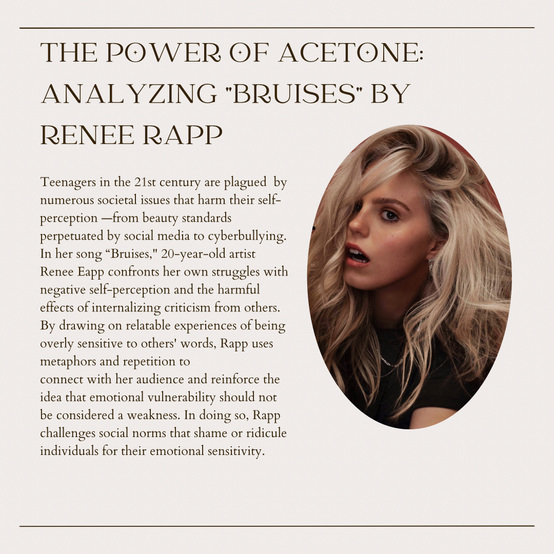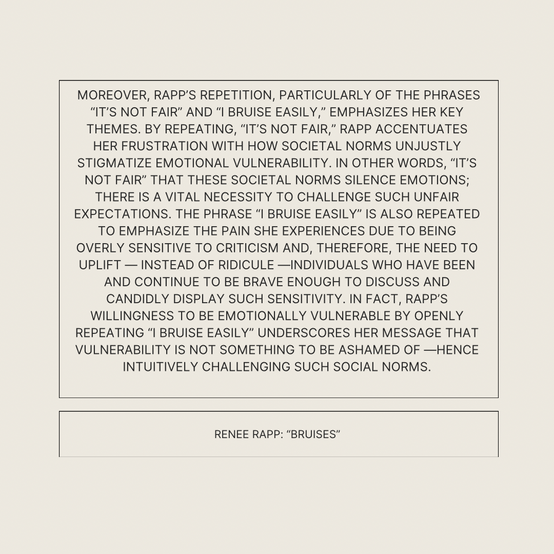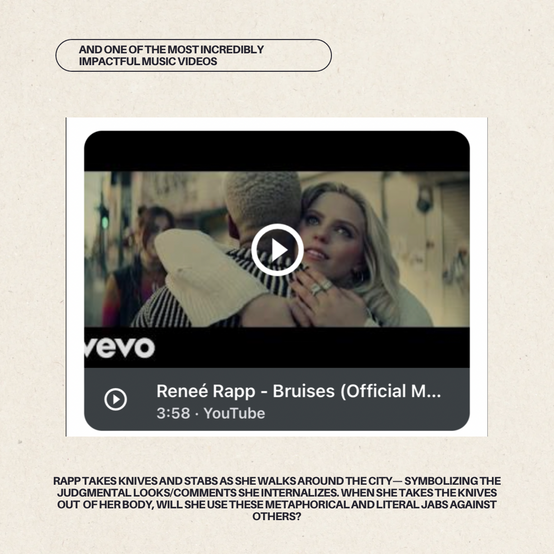The Power of Acetone
- Alissar Dalloul
- May 30, 2023
- 2 min read
Analyzing “Bruises” By Reneé Rapp In Honor of Mental Health Awareness Month
Teenagers in the 21st century face numerous societal issues that can damage their self-perception, from beauty standards perpetuated by social media to cyberbullying. In her song “Bruises,” 20-year-old artist Reneé Rapp confronts her own struggles with negative self-perception and the harmful effects of internalizing criticism from others. By drawing on relatable experiences of being overly sensitive to others’ words, Rapp uses metaphors and repetition to connect with her audience and reinforce the idea that emotional vulnerability should not be considered a weakness. In doing so, Rapp challenges social norms that shame or ridicule individuals for their emotional sensitivity.
Rapp utilizes metaphors to resonate with her audience and encourage them to reject social norms that normalize taking emotional pain without complaint: “It’s not fair / I’ve got acetone for veins.” By comparing herself to acetone, an extremely flammable and combustible substance, Rapp suggests she is similarly sensitive and prone to outbursts, even in response to minor provocations. She combines this metaphor with personal anecdotes from her own life to “prove” this mutual understanding with her audience: “I’ve spent three hundred sixty-five days / … Goin’ over the same thing / That girl said when we’s in fourth grade.” Rapp illustrates past words’ overbearing weight on her thoughts and current self-perception —generating empathy
and enabling her to connect with listeners who have had similar experiences of feeling “overly sensitive” to and obsessively thinking about other people’s comments. By establishing this relatable feeling — and suggesting that being “sensitive” is widely experienced — she encourages her listeners to recognize that being emotionally vulnerable is a normal response, and social norms that say otherwise are wrong.
Moreover, Rapp’s repetition, particularly of the phrases “It’s not fair” and “I bruise easily,” emphasizes her key themes. By repeating, “It’s not fair,” Rapp accentuates her frustration with how societal norms unjustly stigmatize emotional vulnerability. In other words, “it’s not fair” that these societal norms silence emotions; there is a vital necessity to challenge such unfair expectations. The phrase “I bruise easily” is also repeated to emphasize the pain she experiences due to being overly sensitive to criticism and, therefore, the need to uplift — instead of ridicule —individuals who have been and continue to be brave enough to discuss and candidly display such sensitivity. In fact, Rapp’s willingness to be emotionally vulnerable by openly repeating “I bruise easily” underscores her message that vulnerability is not something to be ashamed of —hence intuitively challenging such social norms.
Reneé Rapp’s “Bruises” provides a powerful critique of societal norms that perpetuate negative self-perception and shame emotional vulnerability. By drawing on personal anecdotes and using metaphors and repetition to convey her emotional experience, Rapp connects with her audience and encourages them to recognize the harm of social norms that stigmatize emotional sensitivity. Rapp’s lyrics highlight the importance of challenging such norms and promoting self-acceptance. In a world where social media amplifies and perpetuates harmful messages, Rapp’s message reminds her audience of self-love’s importance and the need to resist societal norms that promote toxic standards.
check out the music video here: https://www.youtube.com/watch?v=SWd25u4mVRw













